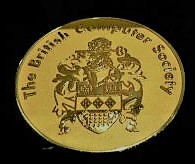TheLovelace Medalwas established byBCS, The Chartered Institute for ITin 1998, and is presented to individuals who have made outstanding contributions to the understanding or advancement of computing.[1]It is the top award in computing in the UK.[2]Awardees deliver the Lovelace Lecture.[3]
| BCS Lovelace Medal | |
|---|---|
 | |
| Awarded for | "Individuals who have made an outstanding contribution to the understanding or advancement of Computing." |
| Country | |
| Presented by | BCS, The Chartered Institute for IT |
| First awarded | 1998 |
| Currently held by | Philippa Gardner Aggelos Kiayias Sue Sentance |
| Website | Official website |
The award is named after CountessAda Lovelace,an English mathematician, scientist, and writer. Lovelace was the daughter ofLord Byron.She worked with computer pioneerCharles Babbageon the proposed mechanical general-purpose computer – theAnalytical Engine,[1]in 1842 and is often described as the world's firstcomputer programmer.[4]
The medal is intended to be presented to individuals, without regard to their countries of domicile, provided a direct connection to the UK. It is generally anticipated that there will be one medalist each year, but the regulation does not preclude either several medalists or no medalist.[1]
Medal recipients
editAwardees include:
- 2024Sue Sentance[5]– for her exceptional contributions and research in computing education.
- 2024Philippa Gardner[5]– for her contributions to mechanised language specification and scalablesoftware verificationand true bug detection.
- 2024Aggelos Kiayias[5]– for his transformative contributions to the theory and practice of cyber security and cryptography.
- 2023Tom Crick[6]– for contributions tocomputer science educationacross research, policy and practice.
- 2023Demis Hassabis[6]– for research in recognition of his extraordinary contribution to artificial intelligence and to the UK technology industry.
- 2023Jane Hillston[6]– for research in recognition of her work developing new approaches to modelling both artificial and natural systems by combining elements of formal languages with mathematical modelling.
- 2020Ian Horrocks[7]– for significant contributions to the advancements ofreasoning systems
- 2020Nick JenningsandMichael Wooldridge– for contributions tomulti-agent systems
- 2019Marta Kwiatkowska[2]– for probabilistic model checking for the data-rich world
- 2018Gordon Plotkin[8]– for contributions to semantic framework for programming languages
- 2017Georg Gottlob[9]– for contributions to the logical and theoretical foundations of databases
- 2016Andrew Blake[10]– for contributions to the understanding and advancement of computing as a discipline
- 2015Ross Anderson[11]– for contributions to building security engineering into a discipline
- 2014Steve Furber[12]– for designing the ARM microprocessor architecture and contributions to computer systems
- 2013Samson Abramsky– for contributions to domain theory, game semantics and categorical quantum mechanics
- 2012Grady Booch[13]– for contributions to software architecture, software engineering and collaborative environments
- 2011Hermann Hauser– for entrepreneurship and for co-developing the BBC Micro Computer
- 2010John C. Reynolds[14]– for contributions to logical foundations of programs and programming languages
- 2009Yorick Wilks[15]– for contributions to meaning-based understanding of natural language
- 2008Tony Storey[16]– for contributions to Autonomic Computing
- 2007Karen Spärck Jones[17]– for contributions to natural language processing
- 2006Sir Tim Berners-Lee[18]– for inventing the World Wide Web
- 2005Nick McKeown[18]– for contributions to router hardware design
- 2004John WarnockofAdobe Systems[19]– for contributions in document processing
- 2002Ian FosterandCarl Kesselman[18]– for contributions togrid computing
- 2001Douglas C. Engelbart[18]– for inventing the computer mouse
- 2000Linus Torvalds[18]– for creating theLinux kerneloperating system
- 1998Michael A. JacksonandChris Burton[18]– for program design and structured programming
See also
editReferences
edit- ^abc"Lovelace Medal".BCS.
- ^ab"Marta Kwiatkowska named as BCS Lovelace Medal Winner 2019".UK:Department of Computer Science,University of Oxford.28 June 2019.Retrieved5 May2021.
- ^"Lovelace Lecture".BCS.
- ^Fuegi, J.; Francis, J. (October 2003). "Lovelace & Babbage and the creation of the 1843 'notes'".Annals of the History of Computing.25(4).IEEE:16–26.doi:10.1109/MAHC.2003.1253887.
- ^abc"Dr Sue Sentance, Professor Aggelos Kiayias and Professor Philippa Gardner recipients of prestigious computing award - BCS Lovelace Medal 2024".BCS, The Chartered Institute for IT. 2024-10-24.Retrieved2024-10-25.
- ^abc"Google DeepMind's Demis Hassabis among the recipients of prestigious computing award - BCS Lovelace Medal 2023".BCS, The Chartered Institute for IT. 2023-11-07.Retrieved2024-09-27.
- ^"Professor Ian Horrocks Awarded BCS Lovelace Medal 2020".Oriel College.2020-11-13.Retrieved2021-10-01.
- ^"Gordon Plotkin awarded Ada Lovelace Medal".UK:University of Edinburgh.2018.Retrieved5 May2021.
- ^"Georg Gottlob honoured with Lovelace Medal".Oxford University Department of Computer Science.
- ^"Professor Andrew Blake named as BCS Lovelace Medal Winner 2016".
- ^"Professor Ross Anderson named as BCS Lovelace Medal Winner 2015".
- ^"Manchester's Steve Furber receives BCS Lovelace Medal, becomes Distinguished Fellow".Electronics Weekly. 10 March 2014.
- ^"Grady Booch presented with BCS Lovelace Medal".BCS. 29 May 2012. Archived fromthe originalon 2015-09-23.
- ^"Lovelace and Needham winners announced by BCS".BCS, The Chartered Institute for IT. Archived fromthe originalon 2011-11-07.
- ^"BCS Lovelace Lecture 2010".BCS, The Chartered Institute for IT. Archived fromthe originalon 2011-12-28.
- ^"BCS Lovelace Lecture 2009".BCS, The Chartered Institute for IT. Archived fromthe originalon 2011-12-28.
- ^"Karen Spärck Jones".The Daily Telegraph. 12 April 2007.
- ^abcdef"Past Winners".BCS, The Chartered Institute for IT. Archived fromthe originalon 2011-10-26.
- ^"2004 Winner".BCS, The Chartered Institute for IT. Archived fromthe originalon 2012-02-12.